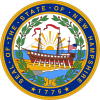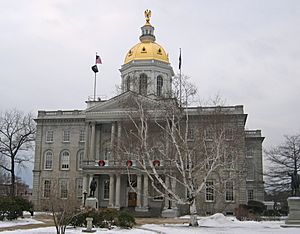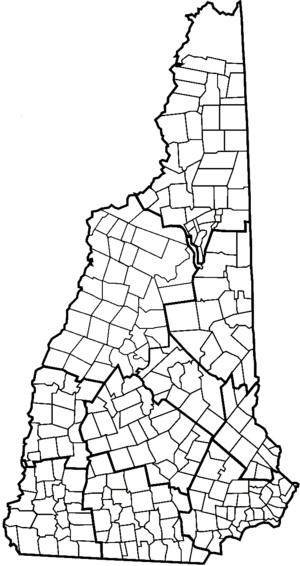Government of New Hampshire facts for kids

|
|
| Polity type | Sub-national administrative division (federated state) |
|---|---|
| Part of | United States of America |
| Constitution | Constitution of New Hampshire |
| Legislative branch | |
| Name | General Court |
| Type | Bicameral |
| Meeting place | New Hampshire State House |
| Upper house | |
| Name | Senate |
| Presiding officer | Jeb Bradley, President |
| Lower house | |
| Name | House of Representatives |
| Presiding officer | Sherman Packard, Speaker |
| Executive branch | |
| Head of State and Government | |
| Title | Governor |
| Currently | Kelly Ayotte |
| Appointer | Election |
| Cabinet | |
| Leader | Governor |
| Deputy leader | President of the Senate |
| Headquarters | State House |
| Judicial branch | |
| Name | Judiciary of New Hampshire |
| Chief Justice | Gordon MacDonald |
| Courts | Courts of New Hampshire |
| New Hampshire Supreme Court | |
| Chief judge | Gordon J. MacDonald |
| Seat | Concord |
The State of New Hampshire has a republican form of government. This means citizens elect representatives to make decisions. Its government is similar to the Government of the United States. It has three main parts, called branches:
- The executive branch includes the Governor of New Hampshire, the elected Executive Council, and various state agencies. They carry out the laws.
- The legislative branch is called the New Hampshire General Court. It makes the laws. It has two parts: the Senate and the House of Representatives.
- The judicial branch includes the Supreme Court of New Hampshire and other courts. They interpret the laws.
The capital city of New Hampshire is Concord. The Governor's office and both parts of the legislature are in the State House. The state Supreme Court and other offices are located across the Merrimack River.
Contents
How New Hampshire Connects to the U.S. Government
Like all states, New Hampshire sends people to represent it in the U.S. government.
New Hampshire's U.S. Senators and Representatives
New Hampshire has two senators in the U.S. Senate. These senators represent the entire state.
Based on the latest U.S. census information, New Hampshire also has two members in the U.S. House of Representatives. These representatives speak for specific areas of the state.
Understanding Congressional Districts
New Hampshire is divided into two areas called congressional districts. Each district elects one representative to the U.S. House.
The 1st congressional district covers the eastern part of the state. This includes Carroll and Strafford counties. It also includes parts of Belknap, Hillsborough, Merrimack, and most of Rockingham County.
The 2nd congressional district covers the rest of the state. It is located to the west and north of the 1st district.
| Chamber | District | Official | Party | First elected | Term expires | |
|---|---|---|---|---|---|---|
| U.S. Senate | At-Large | Jeanne Shaheen | Democratic | 2009 | 2027 | |
| Maggie Hassan | Democratic | 2017 | 2029 | |||
| U.S. House of Representatives | 1st | Chris Pappas | Democratic | 2019 | 2027 | |
| 2nd | Maggie Goodlander | Democratic | 2025 | 2027 | ||
New Hampshire's Electoral College Votes
New Hampshire has four votes in the Electoral College. These votes are used to elect the U.S. President. The number of votes is based on the total number of its U.S. senators and representatives. The state gives all its electoral votes to the candidate who wins the most votes there.
Federal Courts in New Hampshire
New Hampshire is part of the United States District Court for the District of New Hampshire. This is a federal court. Decisions from this court can be appealed to the United States Court of Appeals for the First Circuit in Boston.
Important State Documents
New Hampshire has its own set of rules and laws that guide its government.
The State Constitution
New Hampshire is guided by its constitution from 1783. This document has two main parts. One is a Bill of Rights, which lists the rights of the people. The other is a longer section called the Form of Government.
Unlike the United States Constitution, changes to New Hampshire's Constitution are added directly into the text. It is one of the few state constitutions that mentions the right of revolution. This means people have the right to change their government if it becomes unfair.
The state constitution does not directly say that public schools are required. However, in 1993, the state Supreme Court made an important ruling. In the first Claremont case, the court said the state must provide and fund equal public schools for everyone. This is because the constitution says the state should "cherish the interest of...public schools."
The constitution also talks about the qualities people should look for when electing officials. It also limits how long the legislature can give out pensions.
State Laws
The main collection of state laws is called the New Hampshire Revised Statutes Annotated from 1955.
New Hampshire is unique in some ways. It is the only state that does not require adults to wear seat belts. It also does not require adults to use motorcycle helmets. However, people under 18 must follow these rules. Drivers do not need to have vehicle insurance. But they must show "proof of financial responsibility" after an accident. If they don't, they could lose their driving rights.
New Hampshire is a constitutional carry state. This means people can openly carry or hide guns without needing special permits. The state also has stand your ground laws. These laws allow people to use force to protect themselves or their property.
The state previously had the death penalty for certain serious crimes. The last time someone was executed was in 1939. The death penalty was ended in 2019. However, this change was not for past cases. So, one person remains on death row from before the law changed.
New Hampshire was the last state to require public kindergarten. This became a law in 2007.
Administrative Rules
State agencies create rules to help carry out laws. These rules are gathered in the New Hampshire Code of Administrative Rules.
Branches of State Government
New Hampshire's government is divided into three main branches.
The Legislative Branch: Making Laws
The state legislature is called the General Court. It has two parts:
- The House of Representatives has 400 members.
- The Senate has 24 members.
The General Court is one of the largest legislatures in the world that uses English. The New Hampshire House of Representatives is also one of the largest individual legislative bodies.
Legislators decide how to divide seats based on the U.S. Census every ten years. They use a system called floterial districts to make sure everyone is fairly represented.
State legislators are paid $200 for their two-year term. They also get money for travel. This means they are mostly volunteers. Many members of the House are retired, with an average age over 60.
The Executive Branch: Carrying Out Laws
The executive branch includes the Governor, the Executive Council, and various state agencies. Their job is to put state laws into action and make sure they are followed. The Governor is the top leader of this branch.
The current Governor is Kelly Ayotte from the Republican Party.
Unlike most other states, the Governor shares power with the Executive Council. The Governor leads the Council. Both the Governor and the Council must agree on state contracts over $5,000. They also agree on important agency appointments and pardons. The Governor's power to stop a law (veto) and command the National Guard does not need the Council's approval.
The Governor and Councilors are elected for two-year terms. New Hampshire and Vermont are the only states that still elect governors for two-year terms. Most other states have four-year terms.
New Hampshire does not have a Lieutenant Governor. If the Governor is out of the state or cannot do their job, the Senate President becomes the Acting Governor. After the Senate President, the Speaker of the House, Secretary of State, and State Treasurer are next in line.
The Judicial Branch: Interpreting Laws
The highest court in New Hampshire is the New Hampshire Supreme Court. It is the only court that hears appeals. The Chief Justice leads the judiciary and oversees all the courts.
New Hampshire has three other types of courts and one special division:
- The Superior Court handles major civil and criminal cases. It is the only court that has jury trials.
- The Probate Court deals with trusts, wills, estates, and adoptions. It also handles name changes and guardianship for adults and children.
- The District Court hears cases about families, young people, minor crimes, and civil matters under $25,000.
- The Family Division handles divorce, child custody, child support, and domestic violence cases. It also deals with child protection and juvenile issues.
Political Parties in New Hampshire
New Hampshire has rules for how political parties work.
Voter Registration and Parties
The Democratic Party and the Republican Party are the only official parties in New Hampshire. Voters can register with one of these parties. The state holds primary elections for these parties.
Smaller parties must get at least 4% of the votes in a statewide or Congressional election to become official. They lose this status if they stop getting 4% of the votes. The Libertarian Party was an official party from 1990 to 1994 and again from 2016 to 2018.
If you are registered with an official party, you can only vote in that party's primary election. Voters registered as "independent" can vote in any party's primary. However, they are then automatically registered with that party. Voters can change their registration at the polls after voting or at a town clerk's office.
Primary Elections
New Hampshire holds a famous New Hampshire presidential primary early in the four-year election cycle. State law says this primary must happen at least seven days before any other state's similar election.
Nominations for all other political offices are decided in a separate primary election. This election is held in September of election years. If it's a presidential election year, this is the second primary election in New Hampshire.
Local Government in New Hampshire
New Hampshire has different types of local governments.
Cities and Towns
New Hampshire has 13 cities and 221 towns. There are also 25 areas that are not part of any city or town. These local governments get their powers directly from the state. Their powers are limited to what the state laws allow.
Cities are usually run by a Board of Aldermen or City Councils.
In towns, the main leaders are the Board of Selectmen. Some larger towns might have a Town Council. The Town Meeting is like the town's legislature. Every registered voter can be a member. The Town Meeting approves or changes plans for the town.
Town Meetings happen once a year, usually in March. They decide the year's budget. Special Town Meetings can be called for urgent matters. The municipal election, where town officers are chosen, is also considered part of the Town Meeting.
Governing by Referendum (SB 2)
Since 1995, towns can choose to make decisions using Official Ballot Referenda. This is known as SB 2. In these towns, the Town Meeting discusses issues. But the final decision is made by secret ballot when people vote for officers. To start or stop using SB 2, three-fifths of voters must agree.
School Districts
School districts are separate from city and town governments. They have their own budget and agenda. They also have an elected moderator.
A school district can also use Official Ballot Referenda, just like a town.
Towns often join together to form School Administrative Units (SAUs). This helps manage high schools and sometimes all schools. If a town is in an SAU but runs its own elementary school, voters have a say in both organizations.
Counties
New Hampshire is divided into 10 counties. Counties have a sheriff's department for law enforcement in rural areas. They also have a jail. Some counties might offer other services like nursing homes or social services. In smaller towns, the county might provide services usually handled by towns, like health inspections.
The county's legislature is called the County Convention. It is made up of all the state representatives elected from that county. The county's executive leaders are an elected Board of Commissioners.
Sometimes, people suggest getting rid of county governments. They propose moving county tasks to the state or to cities and towns.
How Local Governments Get Money
All these local governments get most of their money from a property tax. The government's budget is divided among all the properties in the area. So, each property owner pays a share based on their property's value. Some properties or people might pay less tax, like religious groups, schools, charities, or the poor and elderly.
A property owner gets a tax bill that shows different tax rates. These rates apply to the municipality, any special local projects, the school district(s), the county, and a statewide property tax. New Hampshire started the statewide property tax in 2002. This was to help make education funding equal across the state.
The value of a property directly affects the property tax. The state requires towns to re-evaluate property values at least every five years. This helps make sure values are up-to-date with the real estate market. Property owners can challenge a new assessment if they disagree with it.
State Budget
New Hampshire's operating budget is planned for two years at a time. For example, the budget for July 1, 2007, through June 30, 2009, covered Fiscal Year (FY) 2008 and FY2009. Here's a summary of the FY2008 budget:
| Category | Expenditures |
|---|---|
| Health and social services | $1,878,467,014 |
| Education | $1,458,949,429 |
| Transportation | $554,362,042 |
| Administration of justice and public protection | $497,656,860 |
| General government | $489,197,174 |
| Resource protection and development | $232,532,423 |
| Total | $5,111,164,942 |
| Source | Revenue |
|---|---|
| Federal Funds | $1,478,263,227 |
| Other Funds | $1,694,862,406 |
| General Fund | $1,563,832,988 |
| Highway Funds | $276,455,391 |
| Turnpikes Funds | $76,575,234 |
| Fish and Game funds | $12,364,494 |
| Sweepstakes Funds | $8,811,202 |
| Total | $5,111,164,942 |
State Taxes
New Hampshire does not have a general income tax or a general sales tax like many other U.S. states. However, it does have several other types of taxes:
- Interest & Dividends Tax: This tax is 3% for the 2024 tax year. It is set to end at the start of 2025.
- Inheritance and Estate Tax
- Business Profits Tax
- Business Enterprise Tax: This is a 0.75% income tax on small business owners.
- Communications Services Tax
- Electricity Consumption Tax
- Meals and Rentals Tax: This is an 8.5% sales tax on meals, vehicle rentals, and hotel rooms.
- Tobacco Tax
- Real Estate Transfer Tax
- Timber Tax
- Gravel Tax
- State Education Property Tax
- Utility Property Tax
- Local Property Tax
- Fuel Tax



